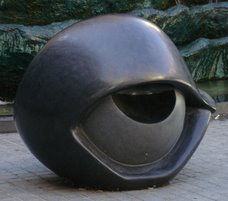I've read two other Milan Kundera books, The Joke and The Book of Laughter and Forgetting. Both were excellent at placing a human face on the suffering and survival of the people of Czechoslovakia under communism. Both were written long ago, and in a very different world from which Slowness springs.
It's not to say I didn't like Slowness, it's just different from what I expected. It's the 1990s, it's Paris, and everyone wants to be on television and one-up their rivals. In stark contrast to this prevailing attitude enters the character of the Czech entomologist - he's a bit of a parody of the Central European character that Kundera's earlier books helped to create - but you can't help feel some pity for him as he attempts to work his way back into his academic community after two decades in exile. There is a scene where he attempts to explain to a conference organizer the historical importance of the diacritical marks that should appear on his misspelled name tag. It's clear that the organizer has no frame of reference for what the proud Czech is talking about - and could care less - but you can't help but cheer the entomologist on. Be proud of who you are - past, present and future!
Some worthy quotes:
"Why has the pleasure of slowness disappeared? Ah, where have they gone, the amblers of yesteryear?"
"He knows that only timid people fear [long pauses] and that when they don't know what to say, they rush into embarrassing remarks that make them look ridiculous."
"A splinter is not so easily extirpated. It is possible to master the pain, repress it, pretend to forget about it, but that pretense is a strain."
"Our period is obsessed by the desire to forget, and it is to fulfill that desire that it gives over to the demon of speed; it picks up the pace to show us that it no longer wishes to be remembered; that it is tired of itself; that it wants to blow out the tiny trembling flame of memory."
"He knows that only the invented story can make him forget what really happened."
"I beg you friend, be happy. I have the vague sense that on your capacity to be happy hangs our only hope."
Subscribe to:
Post Comments (Atom)

No comments:
Post a Comment